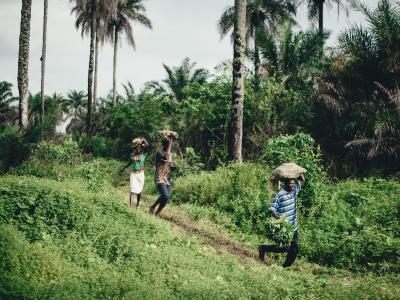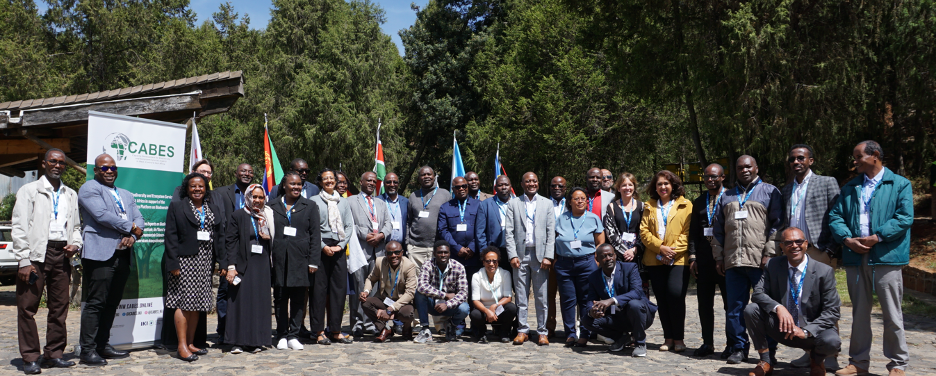Strengthening connections between biodiversity conservation and climate change adaptation in science-policy processes
Strengthening connections between biodiversity conservation and climate change adaptation in science-policy processes
CDKN’s Nadia Sitas and Fatema Rajabali reflect on a recent Africa-focused training provided to the Intergovernmental Science-Policy Platform on Biodiversity and Ecosystem Services (IPBES) national focal points. This learning continues to inform how CDKN will support and strengthen biodiversity conservation and climate change adaptation to build resilience, protect life and foster sustainable land management which are priorities for countries and global frameworks alike.
Biodiversity underpins multiple ecosystem processes and functions that provide critical services to society. Ecosystems can help protect against climate extremes by supporting flood water retention and serving as windbreaks while providing food, fodder and an extensive number of recreational, livelihood-related and cultural services to people. This highlights the close interconnections and feedbacks between biodiversity and climate change through various social-ecological interactions across scales.
With this in mind, CDKN is working with partners to strengthen considerations of the interconnected role of biodiversity in mitigating the impacts of climate change and how ecosystem-based approaches for adapting to climate change can support biodiversity conservation and enhance human wellbeing. In doing so, CDKN will support the integration of these considerations into different country activities to build resilience, protect life and foster sustainable land management which are priorities for countries and global frameworks alike.

One example of CDKN activities in this space is our recent participation in the training of the Capacity Development for Biodiversity and Ecosystem Services Experts (CABES) project for African National Focal Points for the Intergovernmental Science-Policy Platform on Biodiversity and Ecosystem Services (IPBES) and the Convention on Biological Diversity (CBD). CABES aims to develop and strengthen the capacity of professionals in biodiversity-related fields in West, Central and East Africa to engage in IPBES. The two-day face-to-face training in Addis Ababa, Ethiopia provided several reflections for CDKN that will inform our ongoing activities.

Rich experience exists, but scaling peer exchange and co-learning between National Focal Points is essential and needs further support
The participants of the workshop, mainly IPBES and CBD national focal points (NFPs) who juggle multiple roles and responsibilities above and beyond their day jobs, shared challenges and concerns about the limitations of actionable information (i.e., how they can implement specific actions at a national level with limited resources). As discussions unfolded, it became evident very quickly that deep and multifaceted experiential knowledge was already in the room. For example, some countries have active national platforms for engaging key actors from research, policy and practice on issues related to mainstreaming biodiversity into national and sub-national decision-making processes. Others have initiated national ecosystem assessments to generate country-specific information on biodiversity and ecosystem services and how they contribute to well-being. Supporting and encouraging peer learning and exchange initiatives such as those provided by CABES can enable respective NFPs and other national stakeholders to learn from each other and implement new strategies of integration based on the learning.
The importance of investing in co-creating context-specific knowledge to strengthen biodiversity and climate change interlinkages
Participants raised many challenges linked to how existing knowledge and evidence are often produced at inappropriate scales (e.g., at the global scale) and do not pick up on regional or local priorities. Technical assessments and reports need to be translated for decision-makers both in terms of language and also to be better aligned with country priorities. This would facilitate a more diverse understanding of the multiple values of biodiversity and ecosystems, including economic, instrumental and intrinsic values. This is part of a wider discussion on the importance of investing in co-creating locally relevant and actionable knowledge, co-designed with target audiences. Facilitating the inclusion of diverse actors into these processes can help address this by encouraging cross-sectoral thinking and the inclusion of diverse knowledge systems like Indigenous, local and experiential knowledge.
Enhancing the relevance of science-policy assessments by supporting participation in the scoping and review of assessment drafts
Synthesising credible evidence is only one step in co-developing actionable knowledge and evidence. To advance the relevance of science-policy assessments that inform actors' decision choices, or those that affect other actors, especially those from marginalised groups and sectors, we need to ensure that they are scoped and reviewed legitimately and inclusively. Many existing assessments have mechanisms for this, but they are under-utilised by key actors. Addressing this requires simultaneously strengthening the motivation and capacities of diverse actors to be able to engage in these processes through two-way knowledge-brokering activities. This also requires that current engagement barriers be addressed, e.g., language constraints, existing workloads, the short duration of commenting and reviewing periods, and limited knowledge of the realities and needs of end-users. In terms of IPBES, the current review period for the second-order drafts of the IPBES Nexus and Transformative Change assessments is open until 14 January 2024. We urge all readers to take advantage of these windows of opportunity to enhance the relevance of these assessments.
Opportunities for integrating gender equity and social inclusion
The coupled biodiversity and climate crises are predicted to impact those who have contributed the least to their acceleration. The impacts are also not evenly distributed, with women, girls and other marginalised groups bearing disproportionate burdens for adapting to a changing climate and the associated loss of biodiversity and ecosystem services that contribute towards their livelihoods. Convening co-learning opportunities for how gender equality and social inclusion (GESI) approaches can strengthen existing efforts is important to ensure that no one is left behind in conservation and adaptation efforts. Key opportunities exist for this during the updating phase of National Biodiversity Strategies and Action Plans and National Adaptation Plans to align them with the new Kunming-Montreal Global Biodiversity Framework which was agreed nearly a year ago in December 2022. A number of the targets (see more information below) provide important entry points for advancing on GESI outcomes. The research and practitioner community can also assist here by collecting and reporting on disaggregated data to show the gendered or intersectional impacts of climate change and biodiversity loss. This would allow for appropriate response options to address these impacts.
Knowledge of, and access to, sustainable, accessible and flexible financing to implement existing policies
There was repeated mention of the role that finance can play in furthering knowledge and action to address biodiversity loss and climate adaptation, however a limited understanding of what funding options exist that fit the needs of decision-makers. Capacity strengthening is needed to enhance the understanding of existing diverse funding modalities to co-develop fundable projects with multiple co-benefits for people and nature. Additional capacities that strengthen in-built monitoring, evaluation and learning processes are key to capturing the insights and impacts of projects as they are implemented, which can contribute to understanding what types of approaches work. Funding needs to be flexible to respond to emerging learning and outcomes, especially in terms of where extra resources might need to be invested to scale impacts. This scaling should carefully consider opportunities for scaling up (changing institutions at the level of policies and laws), scaling out (increasing the number of people and ecosystems positively impacted) and also scaling deep (accounting for values, beliefs and behaviours that need to shift).
Join CDKN at COP
At COP28 in Dubai, we will be holding several relevant events that will continue to support some of the reflections highlighted in this blog. Do join us at our various side events. We will also be joining partners for sessions on ‘Nature Day’ on 9 December which will showcase efforts to accelerate the implementation of the Kunming-Montreal Global Biodiversity Framework to help deliver a climate-safe and nature-inclusive future.
More information
The new Kunming-Montreal Global Biodiversity Framework includes a number of GESI targets, including Target 8 (Minimise impacts of climate change and ocean acidification including through nature-based solutions and/or ecosystem-based approaches). Target 11 (Nature’s contributions to people are restored, maintained and enhanced), Target 22 (Ensure participation, justice and rights for Indigenous peoples and local communities, women, youth persons with disabilities and environmental defenders), and Target 23 (Implementation follows a gender-responsive approach)
